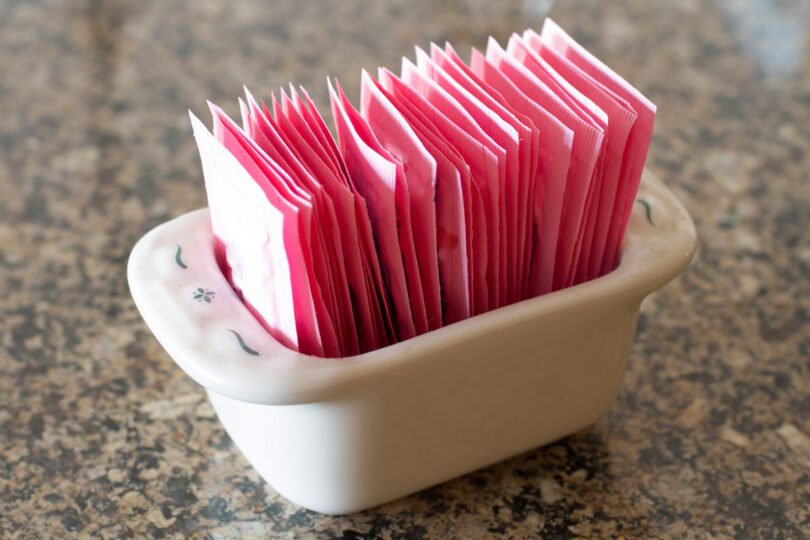For many years, sugar-free sweeteners – whether artificially made or from natural sources – have been considered beneficial to health.
With zero or minimal calories, replacing added sugars helps people control weight and, in doing so, prevent weight-related health problems.
However, in recent years, the potential health risks of sugar-free sweeteners have come to the surface.
In 2023, the World Health Organization warned against using sugar-free sweeteners for weight loss or to prevent unhealthy weight gain. According to the WHO, the evidence was not strong that doing so offered such benefits.
Additionally, there was data suggesting that long-term use of sugar-free sweeteners may increase the risk of type 2 diabetes and cardiovascular disease.
Now, a low-calorie sweetener called xylitol is being called out for its potential to harm cardiovascular health. Here’s what you need to know.
What is xylitol?
Xylitol is a sugar alcohol, or polyol, a type of carbohydrate found naturally in low amounts in some fruits and vegetables. The body also produces it in small amounts.
For use as a sweetener, xylitol is produced commercially from corn cob or birch bark. It can be used to sweeten low-sugar candies, baked goods, frozen desserts, fruit spreads, and condiments such as ketchup and barbecue sauce.
In smaller amounts, xylitol can be added to sugar-free gum, chewable vitamin supplements, breath mints, throat lozenges, and cough syrups.
Xylitol is also sold in bulk as a sweetener for cooking and baking.
The sweetness of xylitol is comparable to table sugar, but because sugar alcohols are only partially absorbed by the body, it provides fewer calories, 2.4 calories per gram vs. four.
Other sugar alcohols permitted in Canada for use as food additives include erythritol, mannitol, sorbitol, maltitol, lactitol and isomalt.
Recent findings
The research, conducted at the Cleveland Clinic and published June 6 in the European Heart Journal, included a number of studies.
First, the researchers examined stored fasting plasma samples from 3,306 participants who had taken part in one of two previous clinical trials in the US and Europe. All underwent elective cardiac tests.
They found that those with the highest plasma xylitol levels had a significantly greater risk of heart attack, stroke or death over three years compared to those with the lowest levels, regardless of gender.
The researchers then found that xylitol accelerated platelet activity when they added it to human blood in a test tube and fed it to mice.
Platelets are tiny cells in our bloodstream that form sticky clots to stop bleeding when blood vessels are damaged. Blood clots can also cause heart attacks and strokes.
Finally, the researchers asked 10 healthy volunteers to drink water sweetened with 30 grams of xylitol, the amount found in two scoops of xylitol-sweetened ice cream, one xylitol-sweetened baked good, or a few pieces of xylitol-sweetened candy. xylitol.
Within 30 minutes, plasma xylitol levels increased 1,000-fold, and the researchers observed a marked increase in platelet activity in all volunteers.
In 2023, researchers found similar results for the sugar alcohol erythritol, which is more prevalent than xylitol in low-sugar products. Erythritol is also mixed with stevia and monk fruit table sweetener.
RESTRICTIONS
While these findings are compelling, there are limitations to consider.
Findings from 3,306 clinical trial participants showed only an association between high plasma xylitol levels and an increased risk of heart attack, stroke, and death. This does not prove that xylitol was a direct cause.
Also, since dietary information was not collected from these participants, it is possible that other components of the diet contributed to the increased risk.
The results also do not prove that increased platelet activity was responsible for these cardiovascular events.
The researchers acknowledged that further studies are needed to assess the long-term safety of xylitol and other sugar alcohols.
Meanwhile…
These new findings add to a growing body of research suggesting that artificial sweeteners are not harmless substances. They should serve as a warning bell.
To limit your intake of xylitol and other sugar alcohols, read the labels. If these sweeteners are added to a food product, the grams of sugar alcohols or polyols must be declared on the nutrition label.
The names of the individual sugar alcohols must also be listed in the ingredients list.
If artificial sweeteners are very much a part of your regular diet, make a plan to cut back gradually. This also applies to added sugars.
What to do instead
Replace artificially sweetened and sugary drinks with unsweetened flavored water or sparkling water.
Gradually reduce the amount of sweetener you add to coffee, tea, hot cereal and other foods.
Use whole fruit to sweeten meals. Add berries to unsweetened yogurt or mix chopped dates into oatmeal. Serve fruit for dessert.
Reducing your intake of ultra-processed foods, many of which are high in sweeteners, is another smart way to reduce your intake of sugar and sugar substitutes.
Leslie Beck, a private nutritionist based in Toronto, is the director of food and nutrition at Medcan. Follow him on Twitter @LeslieBeckRD
#reason #reduce #consumption #lowcalorie #sweeteners
Image Source : www.theglobeandmail.com
